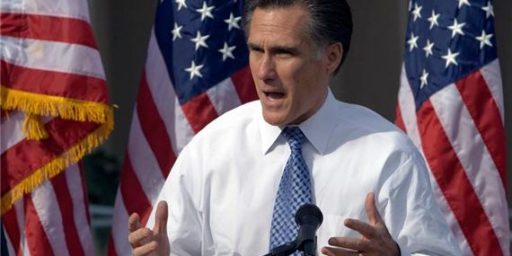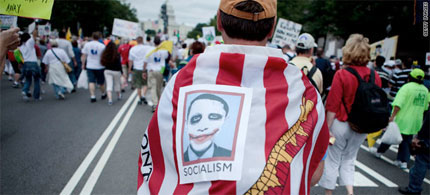On “Black-on-Black” Crime
Yet another example of the need for context when discussing stats.
 There is an important point on the issue of black-on-black crime that I have seen made a few places (such as here) but that has not reached a sufficient critical mass and therefore needs to be repeated and its implications need to be understood. Yes, there is a lot of black-on-black crime but likewise there is a lot of white-on-white crime. Yet, we are constantly told that black-on-black crime is a special problem (e.g., recent comments by Rudy Giuliani) but are not told that white-on-white crime is a similar problem.
There is an important point on the issue of black-on-black crime that I have seen made a few places (such as here) but that has not reached a sufficient critical mass and therefore needs to be repeated and its implications need to be understood. Yes, there is a lot of black-on-black crime but likewise there is a lot of white-on-white crime. Yet, we are constantly told that black-on-black crime is a special problem (e.g., recent comments by Rudy Giuliani) but are not told that white-on-white crime is a similar problem.
To wit: if we look at FBI crime stats we see that in 2011 there were 3,172 murders of whites and 2,630 of the offenders were white (that’s 82.9%). For blacks the numbers are 2,695 murders and of those 2,447 were perpetrated by blacks (90.8%). So while there is more, in terms of percentage, black-on-black murder than white-on-white, it is not by much. Indeed, 82.9%, while lower than 90.8%, is more than enough to state that white-on-white murder is a significant portion of all murders of whites. Yet, this is almost never mentioned. While one frequently encounters head shaking over the state of black “culture” or some such in regards to black-on-black homicide, one almost never sees it with white-on-white homicide.
Ultimately, these numbers are not that surprising: crime is typically committed in the community where criminal and victim live and we, as a society, tend to live in semi-segregated, if not fully segregated, neighborhoods. Further, a large percentage of murders are committed by friends and family, which reinforces the likelihood of same-race crime (source).
The fact that there is a great deal of ranting about black-on-black crime as if it is a special, race-based problem when the same deal is not made about white-on-white crime is indicative of deep racism in the United States. I know some readers will automatically recoil at that assertion, but if one does then one needs to have a cogent explanation of why, a negative aspect of one racial category is treated as a special problem for that racial group while the same problem is not accorded special explanatory significance for the other. It is important to note that black crime is frequently treated as a pathology for blacks that is supposedly tells us something about blacks or black culture, but white crime is typically treated an aberration of white culture (if it is easy specifically noted at all). I would note that we often see the same treatment of black poverty and black receipt of welfare) but do not see identical treatment of white poverty/welfare.
It is important to recall that there are long-standing narratives in US society about out-of-control black males as if they are somehow uniquely dangerous. The whole black-on-black crimes stats, without consideration of commensurate white-on-white crime, is just a continuation of that poorly though-out (and, indeed, racist) position.
A parting note: there are issues of crime linked to poverty that also needs to be addressed on this general topic, but that is an additional discussion.






I genuinely do not understand what is going on in this post. In terms of number, white-on-white murder is roughly the same as black-on-black murder. But the black population is one fifth the size of the white population, which means the rate of black-on-black murder is 5X the white rate.
So… maybe that is significant?
@Political Math: Steven is making a forest-for-the-trees type argument. He’s looking at the talk about black-on-black crime and comparing it to white-on-white crime, as if the issue here intraracial crime. The real issue is x-on-black crime, that is, the question of who is killing America’s black men, whites (among them white cops) or blacks.
Steven’s argument makes sense if you think in race terms (who against whom). If you’re thinking about the safety of the real black people, though, your position makes sense.
@Political Math: Yes, there are other issues to discuss, which relates (at least in part) to the poverty issue I alluded to (crime is more prevalent in poverty stricken areas. Blacks are far more likely to poor, etc.).
However, I don’t think there is a grand mystery in terms of the comparison. Pundits and politicians frequently note the 90% number for black-on-black homicides as if black-on-black crime is especially unique while ignoring white-on-white homicides in terms of who commits those crimes.
Perhaps you both could help me out: what is the point, then, of citing the 90% black-on-black homicide stat? (because if one is trying to capture a stat that would encompass the relative size of the populations and the actual homicide rate, that’s not the right stat).
Id like to see a breakdown by economic class, or even by county/town/zip code. My expectation is that we would see violence doesn’t cross county lines very often, and is directly correlated with the unemployment rate of the criminal’s neighborhood. In fact, I would hazard a guess that this is a stronger correlation than race, gun laws, death penalty, or any of the other common claims.
I wouldn’t be shocked if I was wrong, though, just surprised.
I don’t understand why black-on-black crime keeps coming up in discussions about police killing unarmed black men. Is the implication that blacks don’t value black lives, so white people shouldn’t either?
@Steven L. Taylor:
So true.
Quite often the issue of black-on-black crime is brought up by people as a defense, as a method to deflect a discussion from a race-is-a-factor in police action and in our judicial system. It is often used by people to suggest that the real race problem lies not in a traditional notion of racism, but in the Black community itself.
The Brown and Garner incidents put the issue in the spotlight again, and again new polling shows the sharp divides between both the Black and White communities, and the liberal and conservative constituencies, in how those incidents came to be and how police and judicial officials handled those situations. About half the country blames the victims, and half sees systemic probems in police behavior and in the judicial process that are related to race.
As much as conservatives want to believe that race and racism stopped (or should have stopped) being an issue once the Civil Rights Act and the Voting Rights Act became the law in 1964 and 1965, it didn’t. It is not reasonable to expect the deleterious effects of over 200 years of slavery, apartheid and segregation to magically disappear in a legislative instant. Race is important, it always has been, and will continue to be in decades to come.
@Steven L. Taylor:
Black politicians, community leaders, wonks, pundits, etc are continually on TV talking about how absolutely it is for blacks to interact with the politic. That claim that law enforcement just want to kill young blacks (they use the term black bodies alot). But from a strictly risk analysis POV, other blacks are a much larger risk to blacks than law enforcement. In addition, from your numbers, it should be obvious that blacks are a greater danger to whites than law enforcement.
From a risk communication POV, I believe whites and blacks see their interactions with law enforcement differently. White see it as a voluntary risk: I was speeding and I was pulled over. If I decide to run from the police in a high speed chase or try to grab a police officer, that is on me. However, blacks see to see interacting with the police as an involuntary risks where they have no control and everything that occurs is the responsibility of law enforcement: The pulled me over because I was black. Law enforcement is racist and just want to harm black bodies.
@al-Ameda:
Exactly.
@Gustopher: Easy to answer. It comes up because the discussion is never, ever, merely about “cops killing unarmed men”, or when cops of one race kill an unarmed member of another race, or when black cops kill unarmed white men, or when women cops kill unarmed men, or when male cops kill unarmed women, those are rarely, if ever, given public attention. it’s exclusively about when light-skinned cops kill unarmed dark-skinned men. Only then is it news, only then does it command attention, and only then is the event treated as a crisis.
To do so must ignore other statistics that deepen the discussion to include other factors. Focusing primarily–or exclusively–on the race of the individuals involved, in one particular combination (white cop, black citizen) is arguably racist, or at the very least, unnecessarily distorted.
I’m not sure there’s any reason to exclude any of the relevant factors. Discussing white-on-white crime, black-on-black crime, cross-racial crimes, economic conditions, family conditions (two-parent home, one-parent home?) regional factors, anything and everything that could enrich and inform the discussion. And particularly if it challenges the currently-fashionable propaganda that white-skinned law enforcement officials routinely engage in systematic or intentional killings and beatings of minority populations, particularly dark-skinned citizens, motivated purely by antagonism toward their race.
It’s a false, poisonous idea, promoted for reasons that are self-interested and anti-democratic.
@Pundit Planet: Yes, the real victims here: white people.
@Steven L. Taylor: That’s an unfair reading of his comment. In fact it’s so unfair, I’m not sure it could be called a “reading” at all.
@Pinky: I would disagree.
Black on Black crime is irrelevant because crime is largely a result of a series of socioeconomic problems. In most of the large metropolitan areas of Latin America crime is concentrated in a bunch of neighborhoods – there are many neighborhoods of São Paulo and Tijuana that are extremely safe while there are other neighborhoods that are completely ridden with crime. In the United States there is a strong correlation between race and social class, so, that´s in part explains the statistics.
Take a look at that:
http://g1.globo.com/sao-paulo/homicidios-2013/index.html
There are neighborhoods in São Paulo that have a lower homicide rate than Saint Paul or Wichita. The fact that many cities that have extremely high levels of youth unemployment(And that happen to have a large number of Blacks living there) also have problems with crime is not a coincidence.
@Andre Kenji: Yes, but if we shift the conversation to socioeconomic conditions (and de facto segregation) we have a different discussion (and one we should have) rather than simply pointing to black-on-black crime.
“Focusing primarily–or exclusively–on the race of the individuals involved, in one particular combination (white cop, black citizen) is arguably racist, or at the very least, unnecessarily distorted.”
It would be if the shootings by police of all racial groups were the same. They are not. If it were limited only to shootings, it might be an aberrancy, but it is not. We know that with similar rates of drug use, blacks are much more likely to be arrested. If arrested, much more likely to go to jail. If they go to jail, they do so for longer times.
Steve
Wow, I hadn’t seen it from this side before, but really it makes sense. I think the black on black crime thing is used as a way to justify racism much too often.
Violence that involves white cop on black suspect matters for the same reason that German on Jew or Turk on Armenian or Russian on Chechen matters: history. Events have a context and that context is called history. Refusing to look at context would lead you to believe that Mark Twain and David Duke are equally racist, or that a child standing on his lawn and a child standing on the freeway are equally in danger.
@Steven L. Taylor: Disappointingly shallow reply, but as predictable as the sunrise. Contrary to contemporary pathology, not everything is about race. Pretending it’s so doesn’t make it so. Everyone trying to compete for the imaginary moral high ground, while demonizing opposing views, it brings out the least in all concerned. Racializing everything is the surest way to never achieve anything.
@Pundit Planet: If you can point me to where I have ever claimed that everything (or even most things) are about race, I will be happy to retract. However, the topic of the post was black-on-black v. white-on-white crime and so this comment thread is decidedly about race. The news which inspired this post and others like it are, decidedly, about race.
Indeed, your comment I was responding to was about race. Yes, I was dismissive of the comment. I really didn’t see the point of a long discourse. If there are specific points you feel are worthy of specific discussion I would happy to oblige. In truth, however, I found your assertions problematic and dismissive of a real problem and hence my summation of your comment.
Do you think that the African-American community has no claim to be concerned about the police?
Do you really think crime against whites are ignored?
@Political Math: No, its not “roughly the same”. 500+ more people died at the hands of white assailants that year. Yet, that becomes “roughly the same” so you can focus on percentages that better fit your narrative. Thanks for proving the authors point.
What’s often missing in these conversations is that Crime Statistics are functions of where law enforcement looks for crime. We could drastically change the racial makeup of the prison population overnight if we changed the”War on Drugs (sellers)” to the “War on Drugs (users)” and sprinkled in a War on Sexual Assault which, current data shows minorities are only about 40% likely to engage in. If we really wanted to get cute, we could further refocus the “War on Drugs (crack)” to the “War on Drugs (prescription/designer)”
Won’t happen though. Would hit too close to donors and key constituencies and would certainly shut many moralizers up as the foundation of their belief in black moral corruption would be taken away.
@Pundit Planet: First you advocate discussing ALL relevant statistics….then you call them fashionable propaganda that advance poisonous ideas–all while trying to sound eloquent. Colossal failure.
@Pundit Planet:
One of those happens a lot more than the others, that is why it is a problem.
Sadly in this country race is a shorthand for socioeconomic conditions due to the fact that minorities are overwhelmingly on the short end of that spectrum. I would hazard a guess that once you rip out the overwhelming number of well off whites and pared down that number to match the same number of well off blacks (in other words, control for economic demographics), you would get the exact or very close to the same number of violent crime for the two groups.
But then you are left with the argument about why is it that so many African Americans are so poor and if you want to argue that it’s because they are, as a group, of low moral fiber (or pick your euphemism), then you would also have to explain why it is that if you sliced off only the black middle class an up the preponderance of violent crimes vanishes.
One other way to think about it, if you focus on other crimes, embezzlement, fraud, insider trading, and other financial crimes, do you honestly think African Americans would be the overwhelming perpetrators of those crimes? so why is it we don’t hear more about the moral bankruptcy of Rich White Episcopalians? The utter vacuity of a demographic riddled with financial crimes that must be some kind of moral and cultural failing? Not only that but those crimes effect more people and cause more damage to every one and are a much bigger breach of trust. (not to mention that the same demographic is a much larger recipient of governmental largess then the pitiful amount of means tested welfare that goes to poor minorities).
@Rick DeMent:
Thank you. I’m so tired of those frocked thugs driving way over the speed limit down my street in their Mercedes!
As you indicate – that crime (and it IS crime) does not align with the narrative of “The Streets Are Not Safe – and You Must Protect Yourself from Random Violence from People That Look Different”. The “random danger” meme supports the gun industry, police budgets, home security industries, etc. There is money to be made.
Most importantly, equalizing the labeling puts huge swaths of the donor/voter into the “criminal” class – which means we are not that different after all, Southern Strategy be damned.
@Tony W:
I know right …
@Rick DeMent: Indeed–you underscore part of the point that I am trying to make: talking solely about black-on-black crime or just black crime (as well as black poverty) is often part of a narrative in which blacks, as a class, can be classified as the problem. Not only is this radically unfair it is a a narrative that is racist at its core because it attempts to paint blacks as inferior to whites (who, in this narrative, don’t have these kinds of problems).
Further, it ignores the way that history (slavery, Jim Crow, racism in general) has contributed to black poverty.
@Rick DeMent: Every white-collar or mastermind criminal in the movies is a white Episcopalian. There’s no shortage of stereotyping on both ends of crime.
More importantly, I don’t hear a lot of people on the right talking about why blacks lack moral fiber. The talk is more about how society puts lower-income people in a position where they can’t succeed.
@Pharoah Narim:
Yep. Watch how fast the suburbs empty if we started pursuing that seriously. Watch the freakout when they realize Grandma and Junior are headed for 5-to-20 and the reason why the streets are quiet is all their neighbors are being carted away. The War on Drugs lives a lot closer then most people are comfortable admitting and it’s not just an “urban” problem when a dealer can be the cute little blonde teen next door raiding her parents’ med cabinet.
@KM: The War on Drugs is certainly a useful place to go in this discussion for at least two reasons:
1. It is disproportionately aimed at black (simple illustration is the powder v. crack cocaine example),
2. It is an example in which the actually policies to enforce those laws (no knock raids) needs to be decried.
@Pinky:
And to pursue the logic further, since, in every car chase in the movies, the pursuing good guys are impeded by a fruit cart or a reversing truck, then Law Enforcement are fully justified in campaigning for a ban on fruit carts and reversing trucks.
@Montanareddog: Yes! And if a cop is about to retire, he’s going to get shot on his last case, so police should have randomized retirements.
@Pinky:
…. but it is never ever framed as the flailing of the group as a whole, they are always, every single time, the “one (or two or five) bad apple”.
Followed by a zillion anecdotes about some poor kid who made it out of poverty though guts, talent and determination and why can’t the rest of them do that? And don’t kid yourself, every time someone recites the stats about how black account for more crime per capita then whites they are talking exactly about how Blacks lack moral fiber.
@Pinky:
Can you direct us to some of these conversations?
@anjin-san: http://www.google.com?
@Pinky:
Thanks, I will do a google search for “fiction”
@anjin-san: The thing you have to understand is that conservatives talk about this stuff, but just from a perspective you don’t agree with. When they talk about education reform and the burdens of the welfare state, they’re talking about the issue of poverty. This is something I just found, via google, and it’s pretty representative. I know that you have hearing outside the normal human range, and you’ll probably hear dog whistles when you read it, but that doesn’t change the fact that conservatives care about the issue. (I realize that it’s really, really conservative, and you’d probably be too offended by its characterizations of liberalism if you start from the top, so jump down to Part III.)
It’s just like the original article. Steven hears the black-on-black crime stat, and thinks to make the comparison to the white-on-white stat. That’s because of the framework he’s using. He assumes that the black-on-black number is used by people who want to criticize black people, so he says that whites are just as bad. If you change paradigms, though, you can see that the statistic is meaningful in its concern for the black people who are getting killed. It’s not a code word, dog whistle, dog code, or whatever. It’s genuine concern. In the same way, conservatives who decry the collapse of the black family and the presence of black poverty aren’t playing a racist game of comparing them to the whites. They’re saying that there’s something wrong. Same points, different paradigm. I just read the statistic, on a conservative site iirc, that the poverty rate for black two-income families is 8.4%. I haven’t looked up the white rate, and frankly I don’t care except in that I have the same concern for the white poor as for the black poor. The information in the statistic is meaningful, though, because it implies a path out of multigenerational poverty.
@Pinky:
I’m curious, how much time have you spent with poor people in the last week? In the last year?
@Pinky:
Thanks for the analysis, but no, that’s not the point.
First, the black-on-black (and indeed, black crime numbers in general) stats are typically used in a way to suggest a specific pathology in the black community as if it is uniquely violent.
The point of white-on-white crime is not to say “whites are just as bad” but to note that crime is typically committed within a given community, which means the black-on-black numbers don’t really tell us anything special about blacks.
From the original post:
@anjin-san: You argue two positions: that those who disagree with you are wrong, and that those who disagree with you are racist. It’s possible, I guess, that if I spent less time with the poor than you did, that it could be an indicator of both position A and position B. But to me it looks like a dodge.
@Pinky:
Where have I done that? Please be specific.
And it looks to me like everything you know about the actual lives of poor people in America you learned on the internet, and you don’t want to admit it.
@Pinky:
I was a self-identified conservative for quite a while. I voted for Reagan twice, Bush 41 once, and GW once. You will have to do better than that.
I swear, there were sequiturs around here a minute ago…
@Pinky:
Really?
@Steven L. Taylor: You’re right that that was a poor characterization on my part. On a functional basis, I don’t think there’s much difference between “whites are just as bad” and “black-on-black numbers don’t really tell us anything special about blacks”.
@Pinky:
It’s cool. You make a chickenshit accusation like:
Then you run away when I ask you to back it up. This is about the level of honesty we have come to expect of you here – little to none.
Near the top of that Heritage Foundation piece linked to by Pinky we get this…
I had no idea that organization dealt in science fiction…
@anjin-san: The threads say what they say. People can make their own appraisals.
@Pinky:
Indeed. And the jury is already more or less in on you.
@An Interested Party:
I followed that link with the hope of finding some sort of thoughtful look at the issue on the other side. Imaging my surprise when I instead found the most generic right wing boilerplate imaginable.
But they are really, really concerned about black folks in America.
Really.
more pandering to the race baiters i see- white on black crime is negligible at best, it’s not all about murders, it’s crime period. and black unemployment is one cause only, and something obama has done little to correct in his 6yrs at the helm.
maybe we shouldn’t have created an industry of “poor,black people” after all?
because as in any industry, you always need “supply”.
@bill:
You have a plan to go back and time and stop slavery, Jim Crow, and systematic racism? Cool.
Details?
@bill:
LOL! And what have Republicans proposed as a solution to this? More tax cuts? Privatization of Medicare? I doubt that you or any other Republican can name a single thing that you believe that Obama should have done to reduce unemployment in the Black community, other than give more tax benefits to wealthy Americans.
@bill:
Yes, Mr Obama has taken far too long to singlehandedly clean up the mess the Republicans left for him – even while they threw darts at him the entire time. Yet – he has done it. The economy has not been this good in decades – but that benefit has largely not been realized for black people.
I keep reading about Mr. Obama’s War on Caucasians – not sure how to reconcile the BS rhetoric.
@Steven L. Taylor: the current one, not the past (which was a continuation of something they’ve been and still do). making an industry of poor people is just sick, let them earn a living and stop making excuses for their collective failure.
white guilt is getting old and only holds back those who are addicted to it. whining about stuff that happened 150+ yrs ago is beyond lame, my ancestors had a rough time too but we’ve moved on (and weren’t in America until 1900 anyway)
@al-Ameda: job creation is a 2 way street, obama knew what he was getting into and gave us all “hope/change”……LOL.
@Tony W: you should have just thrown in a “bush/cheney” rant while you’re at it. 6 freaking years, seriously? and nothing for blacks anyway, 0.0. he knew they’d vote for him as they vote for whatever democrat runs,so he took them for granted just like the rest do.
@bill:
What is the world are you talking about?